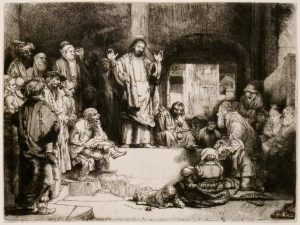Again this Sunday, we hear from Mark’s Gospel (9: 30-37) more about discipleship. The opening line of today’s Scripture passage gives the first subtle point: “They left from there and began a journey through Galilee, but he did not wish anyone to know about it.” (Mark 9:30)
This journey with Jesus is what discipleship entails. At this point in Jesus’ ministry, he is intentionally spending time with his disciples, giving them their final instruction, making sure they truly understand the significance of the new way he is introducing.
Discipleship is following Jesus. Discipleship is walking with Jesus. Discipleship is the way of suffering. Jesus teaches his disciples for the second time that he will have to endure his passion and death, before he will rise again. Discipleship is being among the people.
For the second time, Jesus teaches his disciples that he must first be handed over, suffer death, and rise again. For the second time, the disciples fail to understand. This ‘handing over’ is at the heart of Jesus’ identity. The first ‘handing over’ is that of the Father, who gives his Son to the world in the Incarnation. Jesus’ entire life is one of ‘giving himself’ to others, and his ultimate ‘handing over’ takes place in his passion and death on the cross.
As Messiah, Jesus enters fully into our human condition, in all of its frailty. He allows himself to experience our limited nature as the Son of Man. In her spiritual biography, Elizabeth Kindelmann writes that Jesus told her that during his passion, he did not use his power as the Son of God, but endured his suffering and death as the Son of Man. He of course, trusted in the will of the Father that this must be the path of redemption. In his passion, Jesus allowed the full force and ugliness of evil and sin to fall upon him, only to conquer it once and for all by taking up his life again in the resurrection.
The first reading today from the Book of Wisdom (2: 12, 17-20) speaks of Jesus as the ultimate ‘just one.’ It is precisely because he comes to point out the error of sinful ways that he is obnoxious to the unjust. Jesus pointed out the transgressions of the law of his day and did not shy away from reproaching those who lived in opposition to God’s ways. Jesus proved his gentleness and patience by enduring the revilement and torture of his passion. And the Father did defend him and deliver him from death. This was the way of the just one, and it is to be the way of every disciple.
Once again, the disciples fail to understand that Jesus must suffer and die. Along the way, they discuss among themselves who is the greatest among them. Once they arrive in Capernaum, Jesus, aware of what they had been discussing asks them: “What were you arguing about on the way?” Their response of silence reveals their embarrassment.
Does not the human response of the disciples also reflect our own misunderstanding of discipleship? How many of us are more interested in power and privilege than in following Jesus along the way of the suffering servant? St. James today speaks of the folly of such human understanding. “Where jealousy and selfish ambition exist, there is disorder and every foul practice. But the wisdom from above is first of all pure, then peaceable, gentle, compliant, full of mercy and good fruits, without inconstancy or insincerity.” (James 3: 16-17)
In order to drive home this point of service, Jesus further instructs his disciples.
If anyone wishes to be first, he shall be the last of all and the servant of all. Taking a child he placed it in their midst, and putting his arms around it he said to them, Whoever receives one child such as this in my name, receives me; and whoever receives me, receives not me but the One who sent me. (Mark 9: 35-37)
Our time is not that much unlike the time of Jesus. In today’s world of fascination with celebrities, we too think that privilege and power are to be desired. But Jesus turns this thinking on its head. True greatness is service. To drive this point home, Jesus does not point to the powerful, but rather to a child. He identifies with those who have no power, no prestige, the marginalized and the outcast. Sound familiar? Is this not the message of our Holy Father, Pope Francis?
This teaching of Jesus, his associating himself with a child, not only tells us that our greatness is discovered in service, but that when we serve the lost and lonely, Jesus is mysteriously present there.
So, my friends, let us pray that Jesus continue to set us straight where we are still confused about what it means to be his disciples. May he grant us the grace of patience, perseverance and fidelity.
Peace,
+pde
0